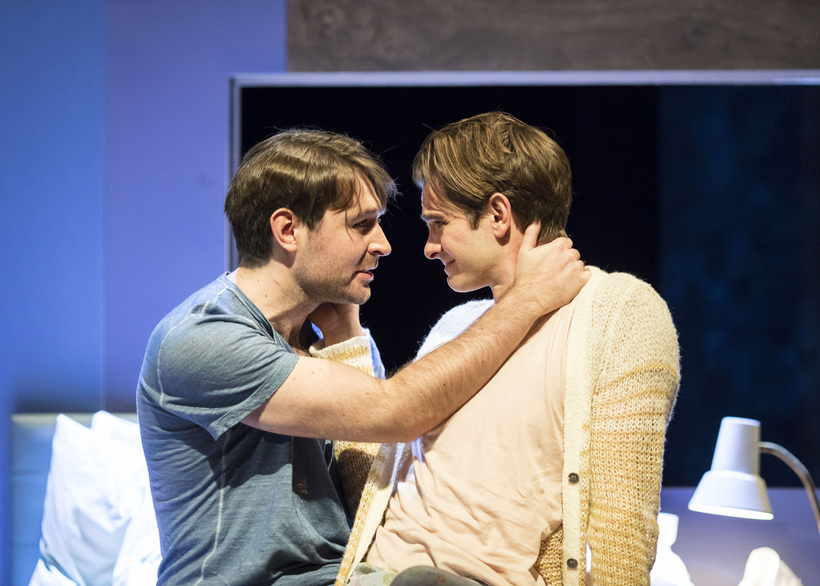In 1993, after premieres on the West Coast and in London, Tony Kushner’s Angels in America: A Gay Fantasia on National Themes struck Broadway like a meteorite. Staged afresh by George C. Wolfe and performed over two full evenings, Kushner’s chronicle of the AIDS epidemic in its early years won the Tony Award for Best Play not once but twice, in consecutive seasons.
In 2018, the double-header returned to Broadway for the first time, a transfer of Marianne Elliott’s triumphant revival for the National Theatre, London. At a cumulative running time of seven unhurried hours, the videos of Part I: Millennium Approaches and Part II: Perestroika—originally streamed live from London in July 2017—pass blessedly without longueurs. The instant classic of yesteryear has become a classic that endures.
Back when the ink was still fresh on the pages, actors of a monastic temperament embraced Kushner’s epic as a holy text—and why not? Wolfe’s show put the fear of God in people. The historic moment had a lot to do with that. Science had identified the novel human immunodeficiency virus only a decade before, and as every spectator in the theater knew, it was galloping through the gay community unchecked, like the Fourth Horseman of the Apocalypse.
For another thing, Stephen Spinella’s cadaverous appearance in the role of an early AIDS patient took people’s breath away. Though his soul was blazing, he inhabited the body of a wraith. Even so, the play gave comfort, too. (Compare and contrast Larry Kramer’s The Lonely Heart, which hit in the mid 1980s, a raw cri de coeur against AIDS-deniers of all stripes.)

Fused from docudrama, soap opera, and medieval miracle play, Angels in America unfolds around two antithetical destinies. At this end of the universe, we find the diva Prior Walter, newly stricken with AIDS, shapeshifting between saintly Camille and flinty Medea. And at the far end, there’s the closeted young lawyer Joe Pitt, drowning in the clingy arms of a Valium-addicted wife. Shuttling between Prior and Joe is the cowardly lover who fails them both. Add to the triangle a vivid scrum of supporting characters. Drawn from real life, the attorney Roy Cohn—reviled to this day as right hand to Senator Joe McCarthy and mentor to the infant Donald Trump—takes the stage as the devil on Joe’s shoulder. Pride of place among the more numerous fantasy characters is the Angel who ravishes Prior, harangues him in tongues, and fills his fevered brain with prophecies.
There’s a Talmudic streak to Kushner’s dialogue (and to his monologues, too). Under Elliott’s direction, the language crackles with electricity. The stage pictures, spartan and rococo by turns, are anchored in the real yet transcend the literal. Amazing, what Elliott manages to pull off with a few lengths of bent neon lights; even more amazing her oddly moth-eaten Angel with the stage-filling wingspan, assisted Bunraku-style by flight operators in deep shadow.
And the actors! I’ll mention three. All Art Nouveau curves and angles, his hair upswept in a lustrous pompadour, Andrew Garfield infuses Prior’s movie-queen theatrics with a viper’s rage for bitter truths. As Roy Cohn, Nathan Lane banishes his comic self to release his inner evil twin, scorning sentiment even in his lonely death scene, attended by a contemptuous ghost. Here is one character denied Kushner’s nigh-universal tolerance for human imperfections. Another is Joe, a lost innocent who disappears unforgiven. In the hands of Russell Tovey, who makes no excuses and at his most battered can smile at grief, he’s a heartbreaker.
Angels In America is available for streaming on the National Theatre At Home Web site
Matthew Gurewitsch writes about opera and classical music for AIR MAIL. He lives in Hawaii

